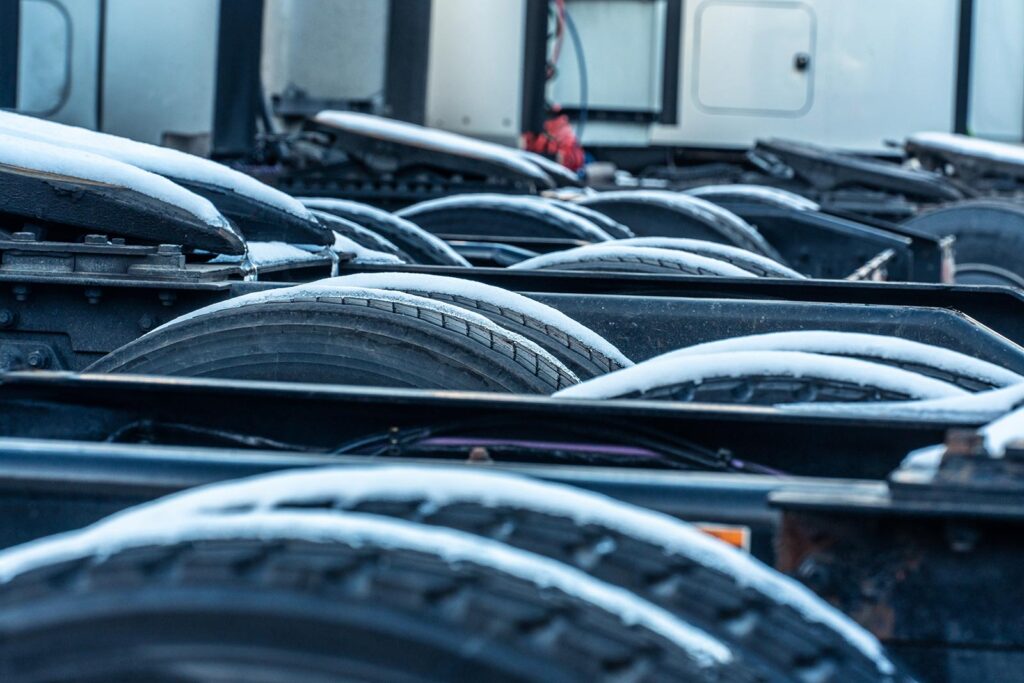During the coldest months of the year, winter weather can sometimes be unpredictable and unforgiving. As truckers, we must do our part to make sure we can survive the winter cold and emergencies. It’s just a matter of time before you are shut down and unable to operate because of highway closures. When this time comes you should make sure you have these items to help you through these trying times.

Truck Equipment and Supplies:
- Jumper Cables – Jumper cables could be your lifesaver in the winter months with cold starts and drained battery cells. You should always have at least one pair of cables just in case your battery is drained, and you need assistance from a helping bystander.
- Snow Chains – If by chance you operate in a state that requires chains during a particular time frame it is your responsibility to have the necessary number of chains required. You should research the chain laws by state to know the requirements. If you are not experienced with the application of chains, you should become familiar with putting your chains on in dry weather to first get the process down.
- Kitty Litter/Salt – During the winter months snow and ice are prevalent therefore the loss of tire traction is very common. You should have agents on your truck that can aid you in regaining traction on your tires, as needed. Kitty litter and salt will help you regain traction if placed under your tires to get you back moving.
- All-Season Windshield Wiper Fluid/Deicer – Windshield wiper fluid is required by DOT standards however during the winter months it is imperative that you have the right type of windshield wiper fluid. The last thing you want to happen is that you get caught in a snow flurry and your wiper blades are frozen. Using an all-season deicer mix will help your wiper blades melt the ice and maintain visibility while driving.
- Anti-Gel Fuel Treatment – The diesel fuel in your tanks will become like gel at a temperature of 15ºF or – 9.5ºC causing difficulty starting your engine. Anti-gel treatment should be added to your fuel when you plan on traveling in areas that are below 30ºF. NOTE: Not all fuel is equal, which means not all cloud points or pour points will be at the same temperature. For instance, low-quality fuels may have cloud points as high as 40ºF. Although most untreated fuel has cloud points around 32ºF.
- Air Brake Anti-Freeze Conditioner – Putting an anti-freeze conditioner is a common method that is used to prevent brake line freezing. Methyl alcohol is the active ingredient in most anti-freeze conditioners. When introduced to the air system, the compressed air travels to the air tank, preventing freezing. The conditioner should be applied to the emergency side of the air brake system (the red glad hand side). Draining your air tanks, and eliminating water and oil regularly is also a good practice.
Personal Supplies:
Although having the necessary equipment/supplies to keep your truck operational is important, you should also have personal items that will help you in the cold winter months. To stay warm and safe, you should stock up on some of the following items:
- Heavy-duty winter clothes/insulated waterproof boots – we’ve seen what the storms and low temperatures can bring in a matter of hours; to insure you do not get frostbite and other complications when dealing with low temperatures/pilled snow, make sure to dress warmly and wear insulated footwear and gloves suitable for winter
- Extra blankets – can help to keep warm in case your truck gets trapped in bad weather and you have no heat
- Pocket-size multi-tool – doesn’t take much space but can be a real life-changer in many situations and helps with almost anything, from cutting wood to opening cans
- Bottled water and non-perishable food items – anything, from canned food to protein bars
- Portable charger for mobile phones/tablets – to prevent your mobile from being empty when you need to call for help
- Flashlights (w. extra batteries) and flares – in case you are stranded and need extra light to inspect and secure your surroundings or signal your position
- Matches or a lighter – when you need to make an emergency fire
- Emergency light sticks/bars
- Whistle
- First aid kit – make sure to include anti-inflammatory medications and ointments, such as NSAIDs and povidone-iodine
It may seem like a lot of additional items to keep in your truck; however, according to our experience, it is much better to be safe than sorry on the roads in the winter!

Leave A Comment